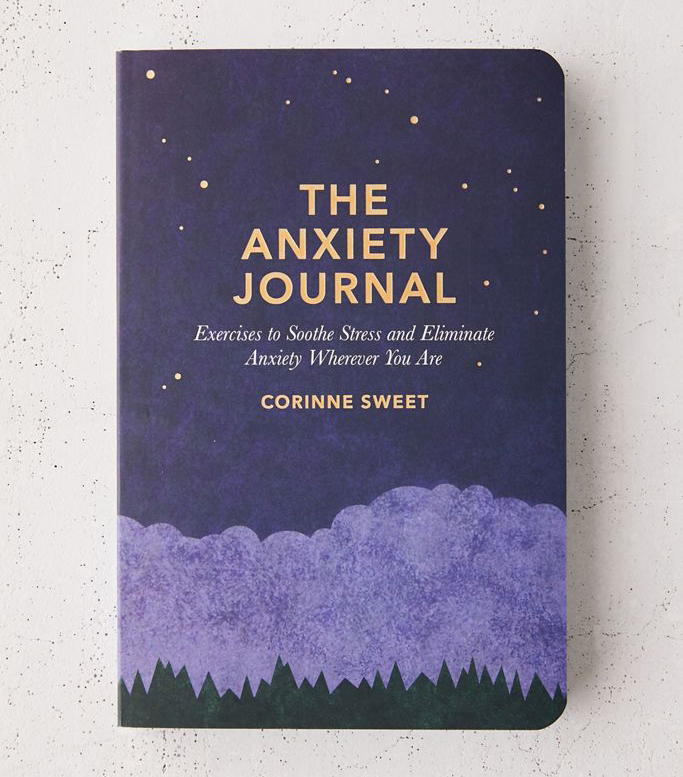4 Myths About Therapy You Should Stop Believing Now


There was once a time when I'd start to search "New York City–based therapists" in Google and feel a knot forming in my stomach as overwhelming thoughts flooded my brain. But the low point I was at in my life was an unfamiliar feeling I couldn't accurately explain to my close friends and family. My mind would not calm down amid all the judgments I anticipated I'd receive for going to therapy. What are people going to think of me? I'm a strong woman; I don't need professional help. Are my feelings even valid?
The question I'm still grappling with now is why is this shame of considering therapy so deeply rooted in my conscious? The truth is I was falling subject to the same hesitations held by many other African Americans who are reluctant to enter into therapy. A 2008 study found that among black surveyees, over a third felt that mild depression or anxiety would be considered "crazy" in their social circles. In their minds, talking about their issues with an outsider like a therapist would be seen as airing one's "dirty laundry," and over a quarter of the participants felt that discussions about mental illness would not be appropriate even among family.

Even more specific to me, research reveals that black women have a higher risk of developing mental illness, attributed to factors including low income, poor health, multiple-role strain, and the "double minority status" of race and gender. A national study determined that 60% of black women experience symptoms of depression. Even so, the use of mental health services is lower for black women compared to white women and African American men.
To motivate myself and others who might be feeling the same way, I set out to explore the myths about therapy and to better understand why we shouldn't fear it.
The Benefits of Starting Therapy

"Initiating therapy is a bold and brave act," says New York City–based psychologist Heather Silvestri, Ph.D. "As such, the benefits of therapy are potentially innumerable. Psychotherapy aims to assist someone in making lasting internal change, such as recalibrating thoughts, feelings, or how you relate to the world. In fundamentally shifting and healing dysfunctional ways of being in your head, heart, and in the world, therapy confers both measurable, concrete benefits such as symptom reduction, fewer negative automatic thoughts or reports of more euthymic moods more times per week, as well as more abstract and overarching benefits such as enhanced self-awareness, insight, agency and empowerment."
Neuropsychologist Sanam Hafeez, Psy.D., also based in New York, believes it's important to consider the benefits of therapy when other aspects of life are being affected by consistent or dominant thoughts. "If someone is feeling anxious or depressed because they are going through a divorce, they could see it affect their ability to focus at work; their sleep or appetite may be affected; they may turn to drugs or alcohol to soothe themselves," explains Hafeez. "Therapy can help people gain clarity about what is triggering the thoughts and how to cope with them. A therapist can diagnose mental conditions like depression, anxiety, ADHD, PTSD, bipolar disorder, and phobias and, if necessary, prescribe medications combined with therapy to help people function in their daily lives."

New York–based clinical psychologist Vivian Diller, Ph.D., brings up the point that sometimes all you need to do is take the first step. "Some people say that the moment they make an appointment to start therapy, they already begin to feel its benefits," says Diller. "Simply acknowledging a problem and the need for help can help people feel less alone and hopeful. There are so many different kinds of therapeutic approaches, but almost all have a similar goal: to relieve emotional discomfort and empower a person to help themselves."
Sure Signs You Should Consider Therapy

It's important to understand that therapy serves everyone in different ways. There is no rulebook when it comes to starting therapy, but there are a few common signs to pay attention to.
"People typically seek therapy when they need relief from emotional difficulties like anxiety, depression, insomnia, addiction, marital problems, or career conflicts," explains Diller. "Every person is different and deals with challenges in their own way, but when symptoms interfere with their everyday life, they often want help. Some rely on family, some find relief in distraction, while others pour themselves into their work, children, or physical activities. But when emotional symptoms become chronic or increase in intensity, it's a good time to consider getting professional help."
The common thread is that if a constant negative force is overtaking your life, you probably need to dive deeper into discovering the cause of it. "Look at the totality of your life and see if your health and well-being is being impacted negatively," Hafeez suggests. "If so, then consider therapy. When you're not sleeping, eating, or able to function through the day-to-day events of life; find yourself unable to get out of bed or leave the home; may have outbursts of anger, physical symptoms like fainting, shaking limbs, just an overall sense of a loss of control, therapy can be beneficial."

According to Silvestri, the vast majority of people seek therapy in crisis. "Maladaptive ways of thinking, feeling, and behaving rise to a level that feels difficult to rationalize or ignore," explains Silvestri. "This is certainly a workable way to present for therapy. Better yet is to be more mindful of signs and signals that you are struggling before they become this acute. Indicators are a subjective experience of emptiness, boredom, or unfulfillment despite having identifiably good things in your life. Things like difficulties in the workplace, academically, or at home and in relationships that are not attributable to a temporary situation alone; symptoms such as anxiety and depression that are not resolving despite conscious attempts to rectify them are all signs to seek therapy."
Why You Shouldn't Fear Therapy

"We've come a long way to reduce the shame about mental health through education," explains Diller. "But shame often results from the unknown or when people feel out of control. Not that long ago, people with severe emotional difficulties were placed in straight jackets and locked up behind bars because society just didn't know how to help. But with the advent of a better understanding of the brain, more effective medications and treatment, we now view mental illness more like we do other illnesses. For example, we now know that schizophrenia is a brain disorder and symptoms like hallucinations and delusions can be controlled biochemically. We know that panic disorder isn't a weakness or the fault of a patient but can be treated with medicine."
Awareness is key, and Hafeez points out that the stigma of shame surrounding therapy is shifting thanks to the new generation. "The more we discuss common conditions such as depression, anxiety, ADD, PTSD, the more people understand that they're not alone and their mental health must be looked at the same as their physical health," says Hafeez. "We also see a rise in the acceptance of how our thoughts impact our physical health. There was a time when having a therapist was something people hid. Now, more and more Fortune 500 companies are even offering mental health programs, counseling, and workshops for employees. People are working with therapists, coaches, acupuncturists. There are apps that help people meditate. There are online psychological assessment quizzes. People are interested in self-care. All of these modalities are forms of self-care."

So where does the stigma come from? "Many cultures, and ours for sure, are imbued with a deep stigmatization of therapy," Silvestri calls out. "Much of the stigma issues from cultural prohibitions against the open acknowledgment of emotional struggle. Reductive, binary concepts of strength and weakness often flow from these prohibitions. However, the human condition is defined in part by emotional and psychological vulnerability. In fact, psychotherapy is premised upon the notion that owning your vulnerability, not a feigned absence of it, is strength."
Silvestri continues, "I would encourage anyone who is fearful of initiating therapy, perhaps especially those from disadvantaged populations for whom notions of power necessarily loom large and salient, to try to reframe the process as one of owning your humanity and personhood. Being a full, three-dimensional person possessed of strengths and vulnerabilities has a lot to recommend it, most notably that it is the only actually sustainable way to be. Anything short of this is a constant (losing) uphill battle. I would add that, much like picturing one's audience in pajamas if you're anxious about public speaking, those fearful of therapy will benefit from recognizing those around them as flawed and struggling if also perhaps strong and flourishing human beings rather than the airbrushed versions we often find on social media. Highly curated images of 'happiness' and those who believe they are 'above' considering therapy rarely enjoy truly meaningfully fulfilled lives."
How to Take the First Step to Starting Therapy

"Get a referral from someone you know who has had a successful therapy experience," suggests Diller. "Or ask a trusted family physician for a name. Then make a onetime consultation appointment only to see what therapy is all about without feeling the necessity of continuing unless you find the first session helpful. If you don't feel comfortable, try another therapist since the key to good therapy is not only finding a qualified therapist, but one who you feel understands you, gets what you're experiencing, and offers a clear path to recovery."
Hafeez wants you to think of therapy the same way you'd think any other doctor. "If you had a terrible pain in your stomach or chest, you would see a doctor for it," says Hafeez. "I look forward to the day when people are diagnosed with a physical condition and mental therapy is also prescribed for healing. The mind is powerful; the conscious and subconscious mind is something to master for a healthy fulfilling life."

"Anyone who begins to acknowledge vulnerability actually is becoming stronger, just by the sheer act of identifying a problem and the potential need for assistance with it," states Silvestri. "In this way, doing that first internet search for a therapist becomes an act of bravery and empowerment. It's so much easier to avoid, rationalize, and seek comfort in a manufactured idea of strength, but also so much more stagnant and unfulfilling. I encourage anyone even remotely contemplating therapy to take a leap and initiate first steps; you can return to your prior aversion to it at any point, but you just might find a path to a higher quality of life in the process."
Like Diller and Silvestri, I look forward to a time when no one has to experience further anxiety about seeing a therapist, let alone googling one. Here's hoping in the meantime, their tips help assuage some people's concerns like they've done mine.
Next up: The 10 Best Vitamins for Anxiety, According to Experts
This story was originally published at an earlier date and has since been updated.
This article is provided for informational purposes only and is not intended to be used in the place of advice of your physician or other medical professionals. You should always consult with your doctor or healthcare provider first with any health-related questions.


